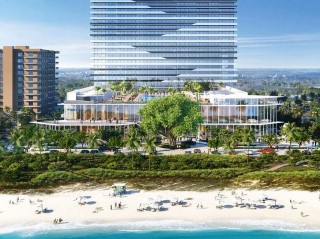About a mile south of the revelry of the Margaritaville resort is a four-acre parcel of public waterfront land that contains a public park, a community center, and a scenic beachscape where weary souls can soothe themselves with the sounds of lapping waves.
|
A rendering of the Related Group's 30-story condominium that overlooks the beach. |
City officials at the time assured residents that the land would be utilized as public space. It is now home to the Hollywood Beach Culture and Community Center and Harry Berry Park. The Sun Sentinel reports that the land is now appraised at $35 million.
During a city commission meeting on
September 14, Hollywood Historical Society president Clive
Taylor chastised the board, invoking the vow he says local
officials made in 1974.
"A promise was made 47 years ago to the residents of our
city by our city leaders with this land," Taylor said. "A
promise that this land would remain open to the public in
order to allow a variance of higher density for the summit
condominium right next to this property."
The language in the deed that Taylor refers to also says —
rather broadly, hence therein lies the contention — that the
city may also use the land for "other public and municipal
purposes," the document reads.
A growing contingent of residents say the prospect of
further beachside, luxury development chokes the last
vestiges of their idyllic city. They've held demonstrations,
designed T-shirts and protest signs that proclaim "NO TOWER
ON OUR LAND," and circulated an online petition that has
garnered nearly 3,000 signatures.
Commissioner Caryl Shuham, whose District 1 includes the
proposed condo site, says she doesn't support the plan in
its current form. She says the Related Group will submit a
comprehensive development agreement for further
consideration sometime in the next few weeks.
Further, a city spokesperson, Joann Hussey, also tells New
Times that the development agreement will be before the
commission sometime in the fall.
The Miami-based developer first submitted its proposal for
the towering 190-unit building in March 2020. According to
the developer's proposal, financing the project is expected
to cost around $270 million. The group's executive vice
president, Eric Fordin, tells New Times the building would
be located a minimum of 515 feet from the sand.
Fordin offers a more nuanced take on the 1974 deed. He
points out that the city would remain the sole owner of the
land itself, and that an enhanced park and expanded
community center plus a restaurant are part of the proposed
development. The developers would get a 99-year lease on the
portion of land containing the condo tower, after which
ownership of the building would revert to the city.
Critics of the condo tower argue that you can't undo
development. “Once you give up a piece of property, you’re
never going to get it back,” Hollywood resident and kayaker
Geoffrey Pearson told the Sun Sentinel earlier this month.
“If it’s developed, it’s going to be developed forever.”
In an interview with New Times, Fordin pushed back on that
idea and insists that the city would not be entertaining his
group's proposal in the first place if it was reneging on
the promise in the 1974 deed.
"The bottom line is that we're having our public outreach
meetings and talking to constituents, seeing what they want
incorporated into the public-benefit package," he says.
"Anything that is currently there today, we're improving for
the public benefit."
The deal currently on the table would allow the city to net
12.5 percent of gross revenue generated from the condos,
Fordin adds.
The promise of more taxpayer money doesn't fly with Taylor,
the historical society president.
"You’re losing credibility when you say you need this for
taxes," he said at the September 14 meeting, "and we don’t
see any improvement whatsoever in the appearance of our city
and our taxes don’t go down."
